The Plight of Christians in Africa
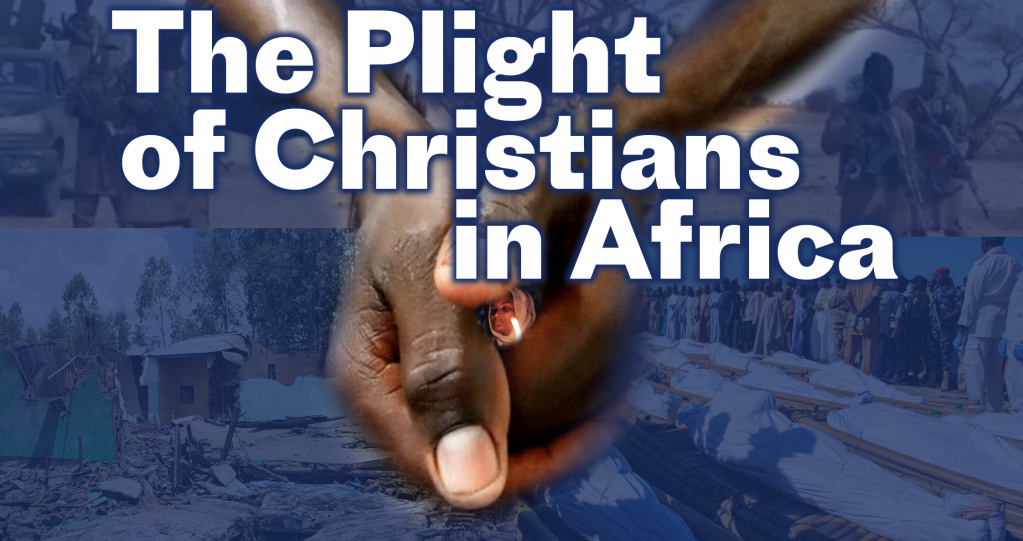
Editorial Column
Over the last few years the epicenter of persecution of Christians has shifted from the Middle East to Africa. The situation in Nigeria is of the greatest concern. According to the level of anti-Christian violence this country ranks first in the world.
Compared to 2019, the level of persecution of Christians in Nigeria grew by a third in 2020. The country accounted for 91 percent of all killed Christians in the world (4,333 out of 4,761). Nigeria has a population of 150 million, and there are 350 ethnic groups speaking 250 languages. About 50 percent are Muslims; 40 percent are Christians, and 10 percent are representatives of local religious beliefs. The main threat to Christians comes from the terrorist group Boko Haram which has been attacking Christians since 2010. In 2015 the terrorist organization Boko Haram was officially merged with the Islamic State.
In 2012, about 35,000 Christians fled Northern Nigeria. From 2011 to 2021, extremists in Nigeria killed 37,000 people, the absolute majority of whom were Christians. This is almost 4,000 people a year, more that 300 a month and 10 daily.
The Boko Haram terrorists often kidnap Christian pastors. In February 2021, they kidnapped Nigerian pastor Bulus Yikura and demanded a ransom before deadline. A video was released showing the pastor, dressed in an orange hoodie with a knife put to his throat. The ransom for Yikura came a few hours before his execution and in early March they let him go. On March 26, militants stopped a minibus on the way from Kaduna to Kafanchan in Nigeria and kidnapped eight Christians. The kidnappers demanded a ransom of 50 million nairas (about $125,000). Kidnapping of civilians, especially Christians, is the Boko Haram’s main source of income. In March, members of that group kidnapped one more pastor for ransom.
Nigerian Christians were also repeatedly attacked by Muslim nomadic tribes – Fulani or Fulbe numbering 35 million and finding home in 15 African countries. Between 2014 and 2019 about 7,000 people fell victims to the Fulani. In March 2021, the Fulani hacked to death with a machete a 36-year-old Christian Bitrus Chollom. The young man left a wife and four kids. In the same month a Roman Catholic priest Ferdinand Fanen Ngugba and six members of his parish were shot dead in Benue State.
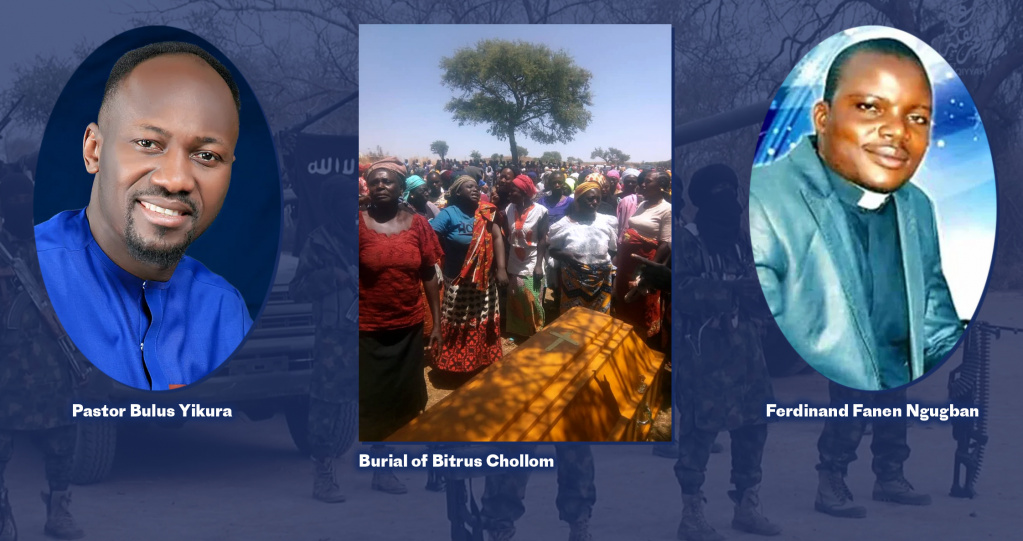
Quite often Christians are the targets of kidnappings for ransom and are killed if not ransomed. At the end of February 2021, the Rev. Harrison Egwuenu, a Roman Catholic priest and rector of St. George’s College in Obinomba, was kidnapped by unknown men in Delta State in the south of Nigeria.
Christians are systematically targeted in Niger and in the neighboring state of Mali. On 18th March 2021, Pastor Johann Giang Bitrusiz of the Shien Baptist Church in Niger was kidnapped by militants. A ransom of almost $158,000 was demanded for him. On 21st March 2021, militants killed 141 civilians in a number of villages in the Tahoua region in the northwest of Niger. Armed bandits rushed in the villages on motorcycles and randomly shot at people. Acting in these countries are the militants from the extremist terrorist group Islamic State West Africa Province, which is a structure of the Islamic State (banned in the Russian Federation).
In Eastern Africa – in Somalia, Kenya and other neighboring countries, attacks on Christians are carried out by the militant group Al-Shabaab. The main tactics of the terrorists is to round up intercity busses, separate Muslims from Christians and kill the latter. In early 2021 in Kenya, terrorists committed a series of arson attacks on church buildings.
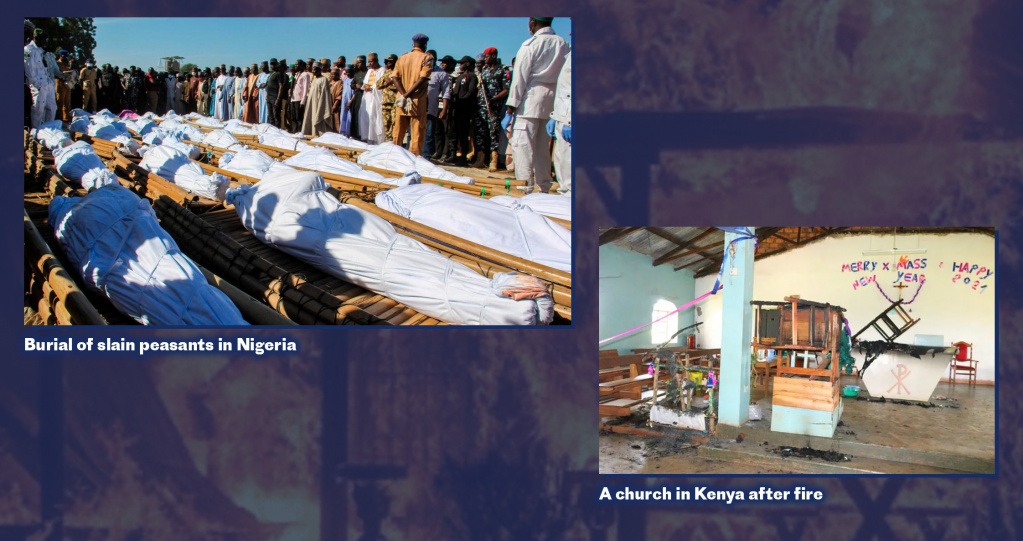
Terrorist groups have recently increased their activity in the Democratic Republic of Congo (DRC), Central African Republic, Cameroon and Mozambique. The main threat to the Christian population of Congo comes from the extremist group United Democratic Forces (UDF). In 2020 alone, the UDF was responsible for 849 civilian deaths, Christians for the most part. In January 2021, UDF militants committed a number of mass murders in villages, in particular those with Christian inhabitants. All in all 100 were executed. In March 2021, a number of terrorist attacks resulted in dozens of Christian victims. Several dozen died as a result of the militant attack on the city of Palma in northern Mozambique, where many French citizens were working in the Total Company building the biggest in Southern Africa natural gas processing and liquefaction complex. The military claimed a successful liberation of the city as a result of an operation that had taken several days.
In March 2021, the actions of militants against Christians in Ethiopia became more active again. The Christians had been already subjected to systematic attacks in 2019 and 2020. At least twenty-nine persons were killed by extremists during their attack on a parish of the Ethiopian Church in the Oromia region in the central part of the country. The rector of the parish and twenty-one women, some of them with babies, were killed. The attackers belonged to the combat wing of the Oromo Liberation Front (OLF).
Persistent attacks on church buildings, clergymen and laypersons of the Ethiopian Church began in 2019 with the assault upon churches and monasteries and the killing of priests and common faithful also during divine services. Hundreds of people died and thousands suffered.
In 2020 the continuing acts of extremism reached Addis Ababa, the capital of the country. The largest church buildings were attacked and a terrible massacre was perpetrated at the construction site of a new church. Massacres continued in other regions of Ethiopia.
We can talk about several thousand killed, tens of thousands maimed and disabled. About a thousand people have gone missing. Atrocities were committed with peculiar ferocity. The perpetrators cut off arms and legs, broke backs, blinded and stoned people, and beat them with rods without distinction to age or sex. Women, children and old people suffered.
Recently, extremists assaulted villages with Christian population in the northeast of the country, committed violence against Christians and arson attacks on church buildings with worshippers inside.
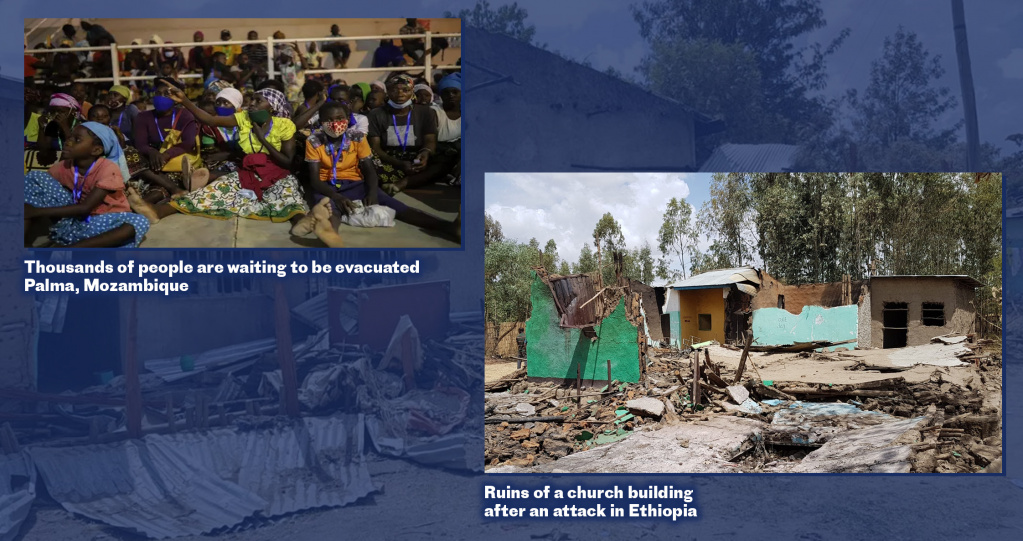
The Russian Orthodox Church has undertaken active efforts in defense of Christians in Africa. Direct contacts with the major Christians Churches on the continent have been established in recent years, including the largest – the Ethiopian and Coptic Churches. The Russian Orthodox Church cooperates with them in bilateral commissions for dialogue. The Primates of the Ethiopian and Coptic Churches visited Russia on several occasions.
As a rule, the perpetrators escape punishment, while the media fail to mention the facts of persecution and they remain unseen to the world. Therefore, a primary form of supporting the faithful of the Ethiopian Church is to convey information about their plight to the general public.
At the request of the Ethiopian Church, the Moscow Patriarchate has undertaken efforts for attracting attention of the world public to the persecution of Christians in Ethiopia. Contacts are being maintained with the hierarchs of the Ethiopian Church concerning humanitarian aid rendered by the Department for External Church Relations (DECR). Ethiopia has a traditionally positive opinion of our country and the Russian Orthodox Church. In autumn 2019, a delegation of representatives of the church and secular mass media led by Hieromonk Stefan (Igumnov), DECR secretary for inter-Christian relations, visited Ethiopia. Members of the delegation were welcomed in different regions of the country by thousands of people holding Russian flags and portraits of Vladimir Putin and Patriarch Kirill in their arms.
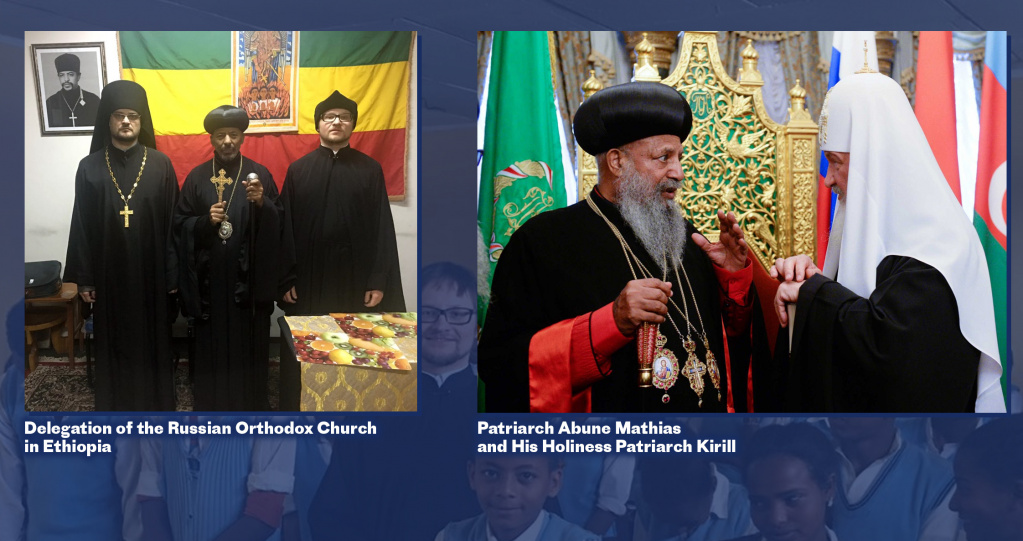
In December 2019, His Holiness Petrarch Kirill sent a letter to the Ethiopian Patriarch Abune Mathias and to H.E. Abiy Ahmed Ali, Prime Minister of the Federal Democratic Republic of Ethiopia, expressing support and concern over the troubling events in the country. His Holiness noted that the developments in Ethiopia could be compared with the persecution of Christian Churches in certain regions of the world where attempts are being made to use religious factor as a vehicle for political purposes and at the same time to intimidate and frighten traditional Christians.
For raising awareness about the situation in Ethiopia and other African countries, an international online conference “On the Plight of Christians in Africa” took place in December 2020 with participation of Patriarch Tawadros II of the Coptic Church who delivered an address and representatives of major Christian Churches in the countries of Equatorial Africa.
It is necessary to underline that Egypt is “a doorway” to Africa, while the Coptic Church plays a key role as a partner in implementing many projects. This is explained by its historical role and great influence on the entire African continent.
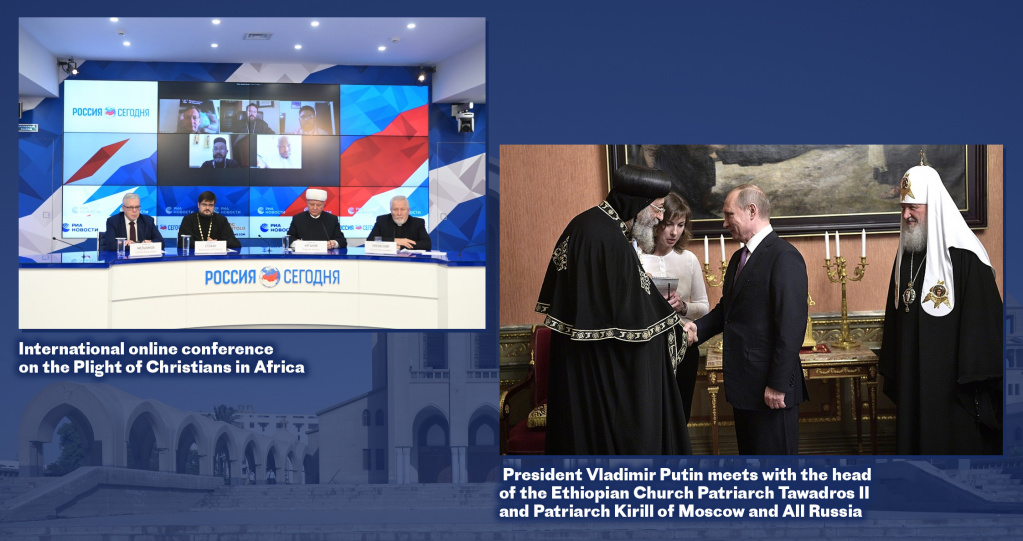
The Coptic Church has maintained close relationship with the Moscow Patriarchate especially during the last seven years. The Coptic Church was the first Ancient Oriental Church with which the Russian Orthodox Church established a commission for dialogue in 2016 that is continuing its work. Patriarch Tawadros II visited Russia in 2014 and 2017, met with the Russian President Vladimir Putin and His Holiness Patriarch Kirill of Moscow and All Russia. The Coptic Church and the Moscow Patrarchate had several exchange visits of the delegations representing the mass media, Synodal departments and monasteries.
Also, the Moscow Patriarchate runs cooperation projects with Christians in Nigeria for the sake of highlighting their sufferings. The DECR has established contacts with the largest Churches in the country. An important event was a visit to Russia in 2019 of Adebajo Anthony Kehinde, a representative of “The Church of the Lord” – the largest Christian community in Nigeria.
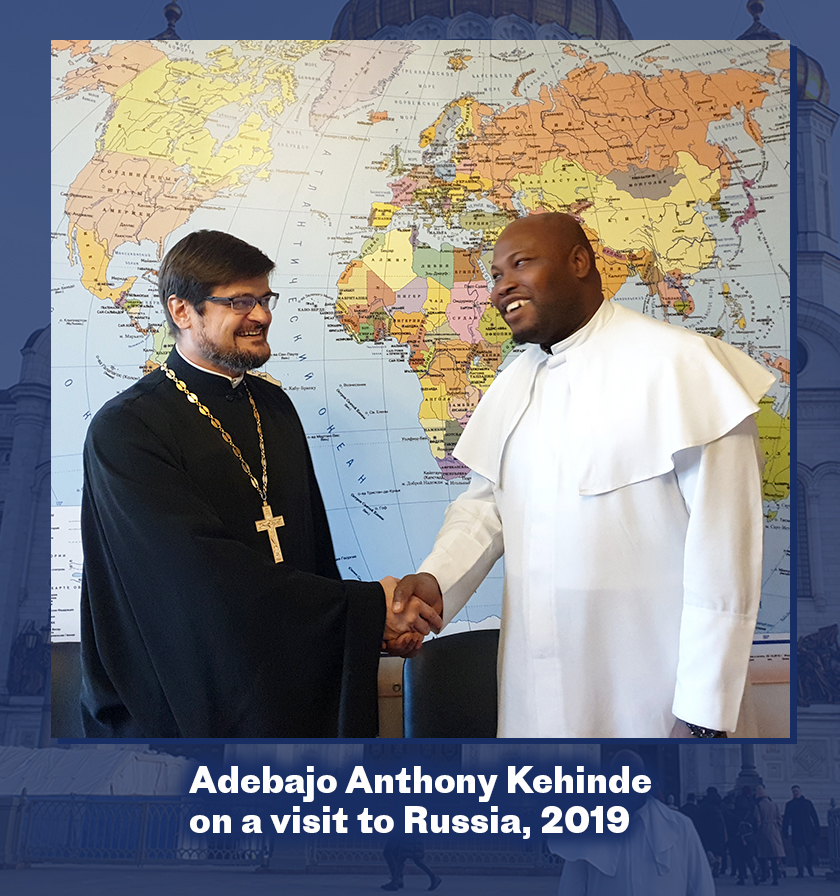
The DECR is maintaining constant liaison with African Christians who have trust in the Russian Orthodox Church. These contacts are a unique resource necessary for implementing humanitarian projects in Africa.
Humanitarian aid is particularly needed in Ethiopia and Nigeria. Christians in other African countries require informational support of Russia for bringing the problem of the persecution of Christians to the world public’s notice. Very important are exchange visits with representatives of African Churches, especially from the countries in which Christians are in minority.
